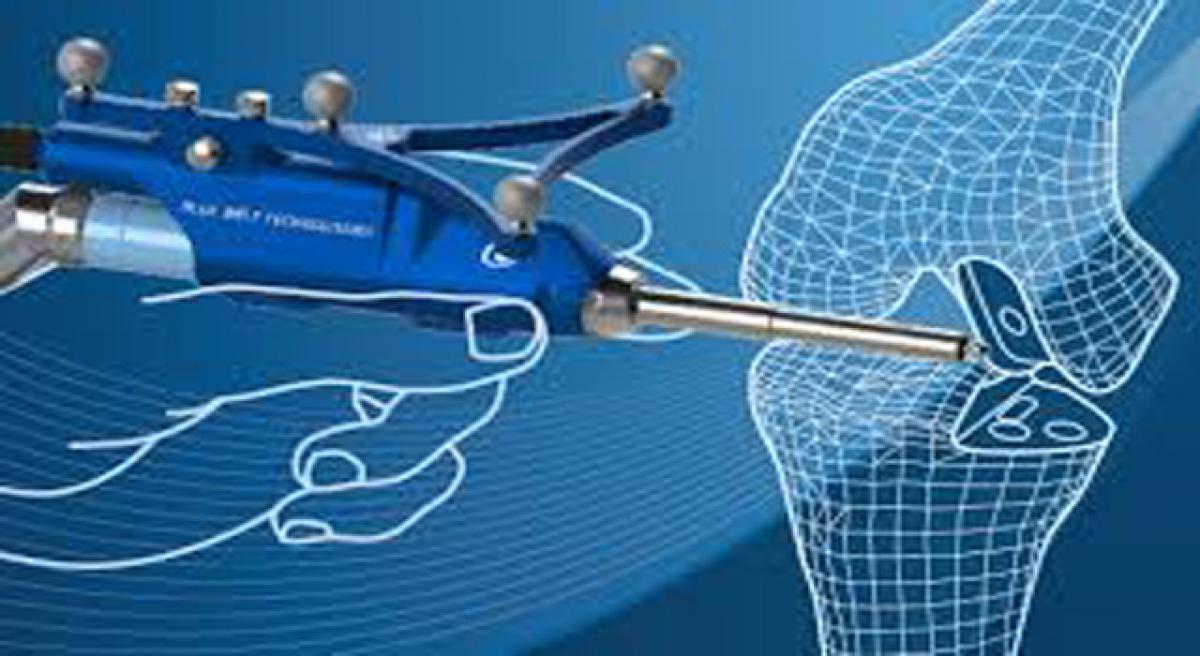Live
- Gau Dhwaj Establishment meeting in Vijayawada on Oct 10
- KSRTC bags two awards
- Hyderabad: Two peddlers arrested, 86 kg ganja worth Rs 30L seized
- Protect drying crops
- Devotees in shock over Tirupati laddu controversy
- 996 Arrested for Misconduct During Ganesh Festival in Hyderabad, Thanks to SHE Teams
- Husband Sentenced to Life Imprisonment for Stabbing Wife to Death
- Paddy compact blocks attract Mexican team
- MLA ST Somashekhar turns against Munirathna
- Retired Telangana State Employee Wins Gold at National Powerlifting Competition
Just In

The world\'s top medical technology companies are turning to robots to help with complex knee surgery, promising quicker procedures and better results in operations that often leave patients dissatisfied.
London: The world's top medical technology companies are turning to robots to help with complex knee surgery, promising quicker procedures and better results in operations that often leave patients dissatisfied.
Demand for artificial replacement joints is growing fast, as baby boomers' knees and hips wear out, but for the past 15 years rival firms have failed to deliver a technological advance to gain them significant market share. Now US-based Stryker and Britain's Smith and Nephew believe that is about to change, as robots give them an edge.
Robots should mean less trauma to patients and faster recovery, although they still need to prove themselves in definitive clinical studies, which will not report results for a couple of years.
Fares Haddad, a consultant surgeon at University College London Hospitals, is one of the first in Britain to use the new robots and has been impressed. However, he agrees healthcare providers need decisive data to prove they are worth an investment that can be as much as $1 million for each robot.
"The main reason for using a robotic system is to improve precision and to be able to hit very accurately a target that varies from patient to patient," he said. "It is particularly useful in knees because they are more problematic (than hips) and there are a chunk of patients that aren't as satisfied as we would like with their knee replacement."
Satisfaction rates are only around 65 per cent for knee operations, against 95 per cent for hips, according to industry surveys. The rival types of robots vary in cost and sophistication, assisting surgeons with precision image guidance for bone cutting and the insertion of artificial joints.
Orthopedic companies hope to emulate the success of Intuitive Surgical, an early pioneer of robots in hospitals, which now has more than 4,000 of its da Vinci machines installed around the world for procedures including prostate removal, hernia repair and hysterectomies.
In addition to selling into big Western markets, they also want to expand robot use in India, China and other emerging markets, where owning a prestigious high-tech system can be a marketing advantage for private hospitals.
Stryker is leading the charge with its MAKO robotic arm, a platform it acquired for $1.65 billion in 2013 and which has pioneered robot-assisted whole-knee operations by determining optimal positioning and then helping with bone cutting.
But it has competition from smaller rival Smith and Nephew, which last week launched a cheaper product called Navio for total knee replacements in the United States. The British group bought the company behind Navio for $275 million in 2016.
That has kicked off the battle in earnest, since both companies are now able to do total knee replacements, which represent the vast majority of knee procedures.
MAKO, which uses only Stryker's joints and implants, costs around $1 million to install, while Navio, which does not have as many features and is not tied exclusively to Smith and Nephew's products, is less than half the price.
Both companies believe their robots will help them capture a bigger share of an orthopedic market that has been split between four big players for more than a decade.
Zimmer Biomet and Johnson and Johnson, the two other big players in orthopaedics, are lagging in the robotics race but both have plans to enter the area in different ways. J&J is working on surgical robotics with Verily, the life sciences arm of Google parent Alphabet, while Zimmer last year bought a majority stake in France's Medtech, a specialist in neurosurgery.
Analysts at Morgan Stanley believe robots have the potential to disrupt a market in artificial joints that has arguably become commoditized, with no knee or hip implant emerging as supreme in recent years. That chimes with the view of Smith and Nephew's Bohuon, who argues that robots give his company a chance to punch above its weight, despite ranking No. 4 in reconstructive surgery.
By Paul Sandle & Ben Hirschler

© 2024 Hyderabad Media House Limited/The Hans India. All rights reserved. Powered by hocalwire.com







